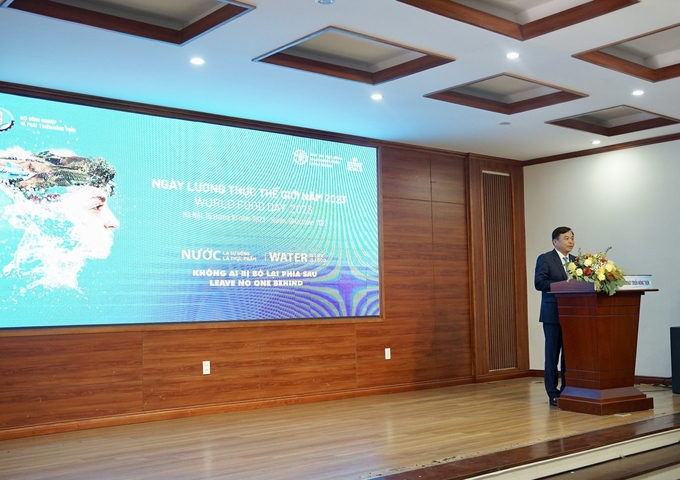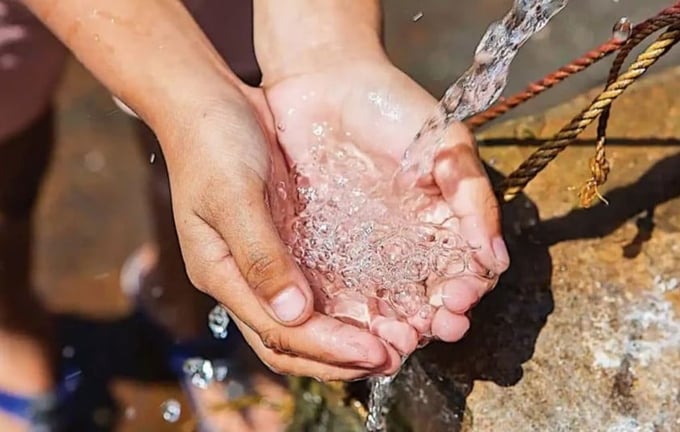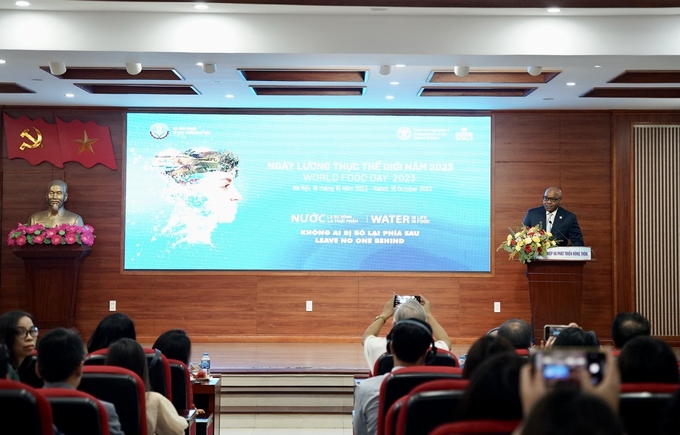November 27, 2025 | 10:59 GMT +7
November 27, 2025 | 10:59 GMT +7
Hotline: 0913.378.918
November 27, 2025 | 10:59 GMT +7
Hotline: 0913.378.918

Deputy Minister Nguyen Hoang Hiep speaking at the program celebrating the 43rd World Food Day. Photo: Linh Linh.
The Ministry of Agriculture and Rural Development (MARD) and the Food and Agriculture Organization of the United Nations (FAO) in Vietnam united forces on October 16 to commemorate the 43rd World Food Day (WFD), the 78th anniversary of FAO, and the 45th anniversary of Viet Nam-FAO cooperation.
Mr. Nguyen Hoang Hiep, Deputy Minister of MARD, Ms. Pauline Tamesis, UN Resident Coordinator in Vietnam, and Mr. Rémi Nono Womdim, FAO Representative in Vietnam, along with leaders and representatives of several government agencies, research institutions, associations, international and non-governmental organizations, as well as Thuy loi University lecturers and students, attended a ceremony at Thuy Loi University in Hanoi to commemorate this occasion.
The theme of World Food Day this year is "Water is life, water is sustenance. Leave no one behind," with the intention of increasing global awareness of the significance of prudent water management. This initiative is crucial because accelerated population growth, urbanization, economic development, and the effects of climate change imperil the availability of this precious resource.

Agriculture accounts for 70% of freshwater used globally.
Water is the basis of our sustenance and a propelling force for people, economies, and the natural world. Indeed, agriculture accounts for 70 percent of the world's freshwater withdrawals, but pure water, like all natural resources, is finite. Sustainable water management and the advancement of the Sustainable Development Goals (SDGs) are dependent on partnerships.
"Tens of millions of Vietnamese depend on freshwater sources for their livelihoods. Vietnam is an agricultural nation. In Vietnam, in addition to a comprehensive legal system, water infrastructure systems are being built and developed synchronously for the management, exploitation, and use of water resources for socioeconomic development as well as the prevention and control of flooding, inundation, and other water-related negative effects. Vietnam faces multiple types of water scarcity, including insufficiency, excess, poor quality, and overuse. In response to these challenges, the Politburo issued Conclusion No. 36-KL/TW dated June 2022 on assuring water security and the safety of dams and reservoirs by 2030, with a vision to 2045”, said Deputy Minister of Agriculture and Rural Development Nguyen Hoang Hiep.
Sustainable integrated water resources management is crucial in Vietnam and around the globe, as it leverages water-related initiatives to support the transformation of agrifood systems and the attainment of the SDGs.
Ms. Pauline Tamesis, UN Resident Coordinator in Vietnam, stated, "We must transform agri-food systems to simultaneously nourish people, nurture the planet, and build resilient livelihoods in the face of climate change."

Mr. Rémi Nono Womdim, Chief Representative of FAO, said that this organization has been cooperating with Vietnam and other countries in implementing the main contents of the Water Action Agenda. Photo: Linh Linh.
FAO also collaborates with Vietnam and other nations to implement critical elements of the United Nations' Water Action Agenda, including National Water Road Maps, water tenures, drought risk management, water data collection, and evaporation monitoring. This agenda is a component of the UN Water Conference of 2023, in which the FAO played a central role.
Mr. Rémi Nono Womdim, FAO Representative in Vietnam stated, "All of us must value water, the food it produces, and the planet it nourishes."
The achievement of agriculture-related SDGs is also a central aspect of FAO's work in Vietnam, which builds on the solid foundations established during the organization's 45-year engagement in the country. FAO is a key partner and the leading provider of technical assistance in the agriculture, forestry, and fisheries sectors in Vietnam, having entered the country in 1978.
At this event, professors and students from Thuy Loi University had the opportunity to share with other delegates their water management expertise, data, and practical activities.
Mr. Rémi Nono Womdim emphasized five action fields that must be implemented in the short, medium, and long term to strengthen the management and preservation of water resources.
First, it is essential to strengthen national capacity for water resource inventory implementation.
In addition, the inventory must accompany the allocation of water resources to ensure that the allocation is accurate, fair, and transparent, and that water is supplied to all parties for the appropriate use.
There is a need for intersectoral cooperation through the adoption of legal policies and advanced technologies. Farmers should be provided with accurate information and management tools, as well as integrated solutions, in order to promote the effective exploitation, use, and conservation of water resources.
Mr. Womdim added that effective social assistance measures would be required to assist the vulnerable population, thereby enhancing adaptability and consolidating the social welfare network.
In conclusion, it is essential to garner the participation of the public and private sectors and to formalize commitments to reduce emissions throughout the supply chain.
Translated by Dieu Linh

(VAN) As floodwaters recede, a vast network of irrigation works across eastern Gia Lai is emerging in a state of severe disrepair, with extensive damage demanding urgent restoration ahead of the 2025-2026 winter-spring cropping season.

(VAN) The conference reviewing three years of implementing Decision 911 identified the need to prioritize improving marine environmental quality and promoting sustainable fisheries development.

(VAN) Le Hoai Trung, Member of the Communist Party of Vietnam Central Committee and Minister of Foreign Affairs, held talks with Vi Thao, Chairman of the Guangxi Zhuang Autonomous Region (China) this week.

(VAN) The Mekong River Commission adopts the 2026 - 2030 Strategic Plan with a people-centered approach.
/2025/11/26/1720-1-200855_132.jpg)
(VAN) Viet Nam and Japan have many conditions to expand cooperation on climate change adaptation, particularly in disaster risk management based on advanced technologies.

(VAN) The strong development of digital technology and artificial intelligence is opening up opportunities to transform science and technology into a 'Magic eye' for disaster forecasting and early warning.

Applying vaccines and proactive disease prevention helps pig herds stay healthy, maintain productivity, reduce risks, and decrease reliance on antibiotics in modern livestock farming.